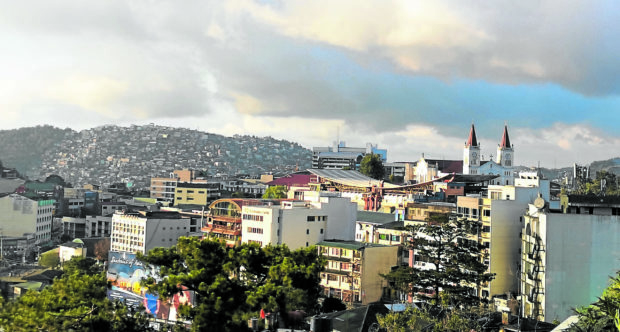
ROAD TO RECOVERY Businesses and leisure spots in Baguio, the country’s summer capital, are gradually reopening as the city manages to contain the spread of COVID-19 through strict health checks, contact tracing and border controls. (Photo by EV ESPIRITU / Philippine Daily Inquirer)
BAGUIO CITY, Benguet, Philippines — The city government will allow businesses to operate at full capacity this week as some leisure areas have reopened for residents to stimulate the Baguio economy while under modified general community quarantine.
But the 20,000 business establishments and offices in the city must enforce minimum health standards, such as physical distancing and the mandatory use of face masks, said Mayor Benjamin Magalong.
“We have to make our people feel confident that they are safe in Baguio, otherwise, our economy will suffer,” he said.
Lawyer Althea Alberto, Magalong’s executive assistant, said restrictions on movement have eased with a shorter curfew from 10 p.m. to 4 a.m.
Groceries and shopping malls may adjust their schedules and operate until 8 p.m., but residents must be home by 10 p.m., she said.
Barbershops and salons were already allowed to serve 50 percent of their capacity. Starting July 1, the number coding ordinance will again be enforced to reduce the volume of vehicles on city streets.
Designated market days have been increased to three. The market is also open on Sunday, the only day allowed for the elderly (age 60 and above), teenagers and children.
Camp John Hay also reopened its leisure spots to the public last week.
Under review
The local government has also been consulting transport groups to determine if it would reopen the city to provincial buses.
Magalong said he would also review the liquor ban that had been enforced since the lockdown.
But the city government expects a 40-percent drop in tax revenues because the quarantine has crippled most businesses, according to city treasurer Alex Cobarrubias. Hardest hit were companies operating at the Baguio City Economic Zone, he said.
Baguio also wants to maximize the public market, a prime real estate, which can be a key stimulus resource for the economy.
But during the city council session on Monday, Magalong said a financial review showed the Baguio government could not afford to build a modern public market.
—Vincent Cabreza